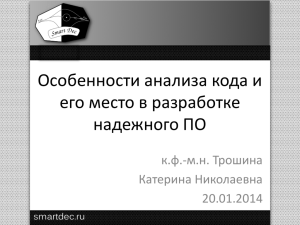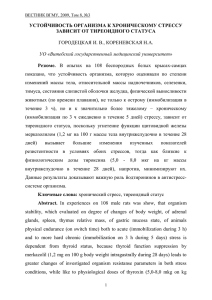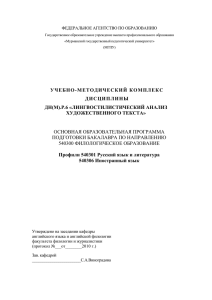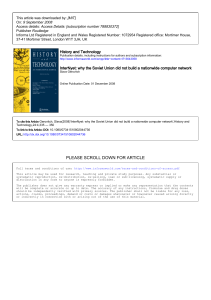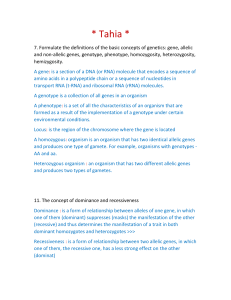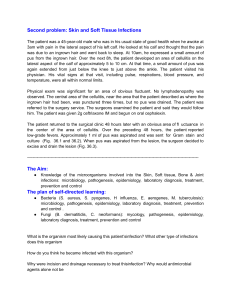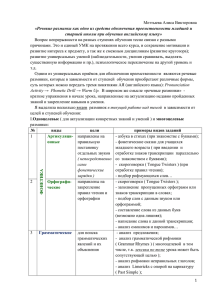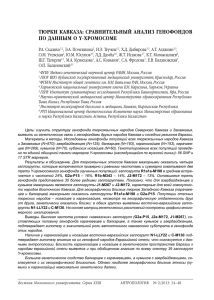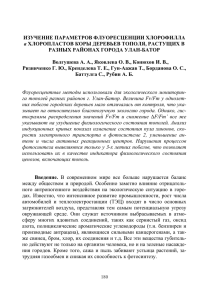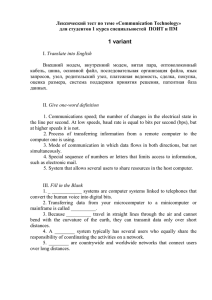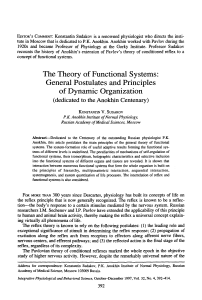Книгавко1_кибернетика_eng_ХНМУl
реклама
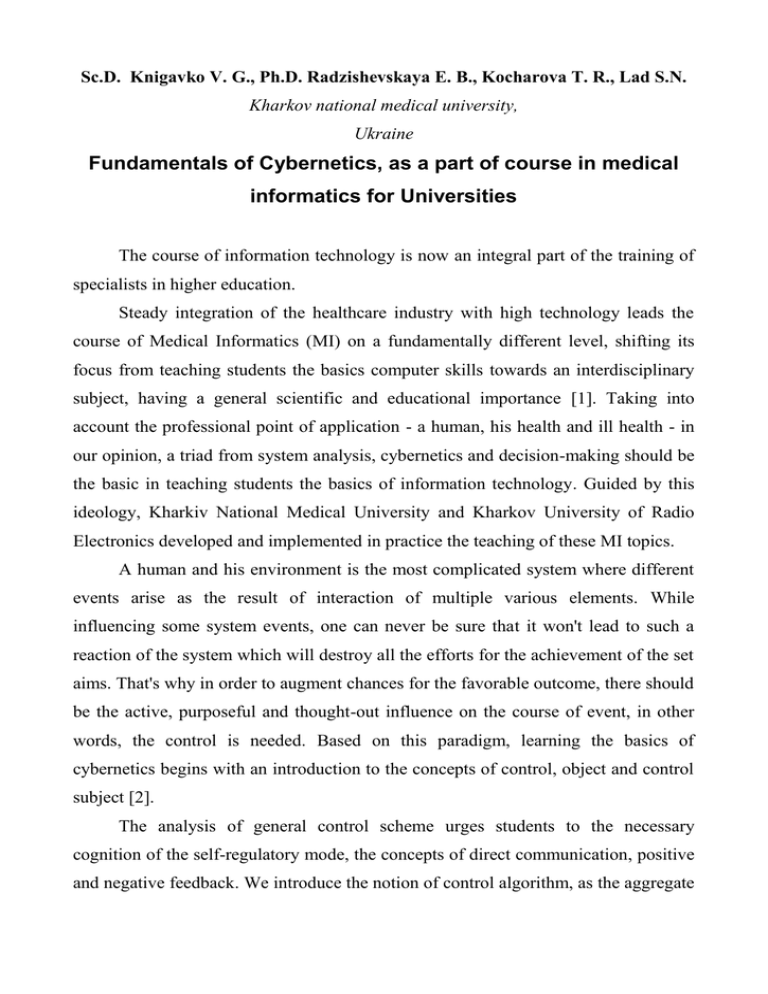
Sc.D. Knigavko V. G., Ph.D. Radzishevskaya E. B., Kocharova T. R., Lad S.N. Kharkov national medical university, Ukraine Fundamentals of Cybernetics, as a part of course in medical informatics for Universities The course of information technology is now an integral part of the training of specialists in higher education. Steady integration of the healthcare industry with high technology leads the course of Medical Informatics (MI) on a fundamentally different level, shifting its focus from teaching students the basics computer skills towards an interdisciplinary subject, having a general scientific and educational importance [1]. Taking into account the professional point of application - a human, his health and ill health - in our opinion, a triad from system analysis, cybernetics and decision-making should be the basic in teaching students the basics of information technology. Guided by this ideology, Kharkiv National Medical University and Kharkov University of Radio Electronics developed and implemented in practice the teaching of these MI topics. A human and his environment is the most complicated system where different events arise as the result of interaction of multiple various elements. While influencing some system events, one can never be sure that it won't lead to such a reaction of the system which will destroy all the efforts for the achievement of the set aims. That's why in order to augment chances for the favorable outcome, there should be the active, purposeful and thought-out influence on the course of event, in other words, the control is needed. Based on this paradigm, learning the basics of cybernetics begins with an introduction to the concepts of control, object and control subject [2]. The analysis of general control scheme urges students to the necessary cognition of the self-regulatory mode, the concepts of direct communication, positive and negative feedback. We introduce the notion of control algorithm, as the aggregate of rules according to which the information which enters the controlling system, is transformed into controlling signals, is called the control algorithm (law). It is to be underlined that the main task of the controlling system (control subject) is such a transformation of the information which enters the system and formation of such controlling impacts which provide the achievement of control aims. Under the influence of controlling impacts the system takes the best (in a certain meaning) state, than during the absence of controlling impacts [3]. Clinical medicine today is the modern industrial technology which demands scientifically-based approaches to control . Under the control of the quality of medical help the following options are meant: - organization of the correct handling of healthy people (discovering the risk factors); - organization of the correct prophylactics of diseases in the groups of risk; - organization of the correct treatment and correct rehabilitation of patients. The aim of such control is obtaining maximally possible results taking into account the modern level of knowledge at minimal level of expenses. Within the framework of investigated problem, considerable attention is paid to the subject, method and content of the biological and functional cybernetics. The study of the functional cybernetics begins with a consideration of the main clauses of the general theory of functional systems and principles of interaction of functional systems in an organism. Principles and features of organism's functional systems need to be taken into account during the consideration of the common functioning of different organs. It is possible to evaluate the casual relationship of the events by means of following direct communications and feedbacks: from controlling centers to the result of work of executive organs and back to controlling centers. In every functional system the main cybernetic principles are executed: – regulation by the final result with feedbacks, – information evaluation of the final result. The usage of the functional cybernetics allows to distinguish in the general dynamics of the activity of vital functions the most important links, the impact of which can augment the life potential of an organism. Regulation of the organs' functions, their systems and human's organism in general with the aim to keep the homeostasis at extreme conditions and pathology makes up the basis of the wide area of research – medical cybernetics. Medical cybernetics studies the functions of the human's organism, on the basis of the control laws, and also considers the problems of treatment and disease prophylactics on the basis of the control laws, objectively peculiar to all natural and artificial objects [4]. A living organism in general and its separate elements in particular are considered to be systems where the information perception, accumulation, procession and transmission take place and also the corresponding reactions are developed (control actions), which provide the normal course of all the vitally important processes. From the point of view of the medical cybernetics any disease is considered to be the violation of the processes of information receipt, transmission and procession or the result of the wrong controlling impact (wrongly prescribed treatment) [5]. Medical diagnostic process is also a typical cybernetic process and is connected with the information accumulation, transmission, storage and procession [6]. The analysis of the diagnosing process by a doctor showed that only this process in the insignificant level depends on the intuition. In general, during diagnosing a doctor widely uses the experience accumulated in his memory, data obtained during the examination of a patient and acts according to the certain rules, which he was either been taught or he has achieved himself in the process of the medical practice. This way, a doctor acts in accordance with the diagnostic algorithm. Therefore, the basic knowledge of cybernetics and their application on the human body is an essential link in the formation of a scientific outlook of future medical specialist and a necessary stage in his training [7]. Literature: 1. Згуровский М.З., Болдак А.А., Ефремов К.В. Интеллектуальный анализ и системное согласование научных данных в междисциплинарных исследованиях/ Згуровский М.З., Болдак А.А., Ефремов К.В.//Кибернетика и системный анализ.-№3.-2012.-с.62 2. Чикрий А.А., Раппорт И.С. Метод разрешающих функций в теории конфликтно- управляемых процессов/ Чикрий А.А., Раппорт И.С.// Кибернетика и системный анализ.-№4.-2012.-с.40 3 .Кириченко Н.Ф., Гавриленко С.А., Гавриленко А.С. оптимизация параметров функциональных преобразований в системе классификации сигналов./ Кириченко Н.Ф., Гавриленко С.А., Гавриленко А.С. // Кибернетика и системный анализ.-№5.-2011.-с.98 4. Чеченин Г.И. Системный подход и системный анализ в здравоохранении и медицине : монография/ Г. И. Чеченин. – Новокузнецк: МАОУ ДПО ИПК, 2011. – 347 с. 5. Карп В.П., Чибисов С.М., Агарвал. Пути развития отечественной медицинской кибернетики. Предпосылки и перспективы./ Карп В.П., Чибисов С.М., Агарвал.//Здоровье и образование в XXI веке.- т.13.-№1.-с.90-100 6. Долгополов И.Н. Моделирование многофакторного лечебного воздействия на биосистему./ Долгополов И.Н.// Кибернетика и системный анализ.-№5.-2012.с.25 7. Згуровский М.З., Гвишиани А.Д., Ефремов К.В., Пасичный А.М. Интеграция украинской науки в мировую систему данных./ Згуровский М.З., Гвишиани А.Д., Ефремов К.В., Пасичный А.М.// Кибернетика и системный анализ.-№2.2010.-с.49
